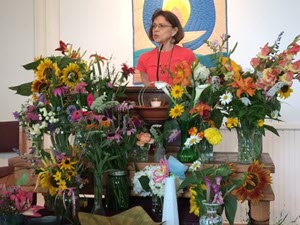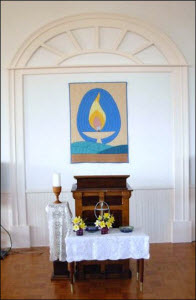
HUU Sermon Archives
Song of Songs
by Eric LaFreniere
February 15, 2004
READING 1
Stamp me in your heart,
Upon your limbs,
Sear my emblem deep
Into your skin.
For love is strong as death,
Harsh as the grave.
Its tongues are flames,
a fierce and holy blaze.
Endless seas and floods,
Torrrents and rivers
Never put out love's
Infinite fires.
And now, for something completely different!
When I was told that I could give the St. Valentines Day service, I was thrilled with the chance to take advantage of the liberal good nature of our fellowship to give vent to a Catholic transgression fantasy. In short, I resolved to give a church service on the conjunction of religion and SEX. Thank you for allowing me this opportunity! If there's blushing today, everything's going according to plan.
At first I thought to seduce you with dreamy visions of Tantric temple facades, illuminated Taoist manuscripts, obscure Gnostic and alchemical rituals. Of course, I had other visions -- too personal to share.
. . .Too much information -- to cover in a single service. I realized I would have to remain focused. Inspired by our minister and our not-so-usual bible class, I chose to concentrate on the Bible, which is, after all, full of SEX.
For example, Abraham is a man with several wives and concubines, a man consumed by jealousy and the idea of spouse-sharing.
The sons of Noah, who were the only righteous family left on earth, "uncover their father's nakedness," a euphemism for incest.
Speaking of which, Lot flees Sodom only to sleep with his own daughters, who deliberately seduce him in order to bear his children.
Jacob marries out of convenience but lusts for another woman, his wife's sister to be exact, for most of his adult life.
The Egyptian eunuch Potiphar apparently buys Joseph -- as a sex-slave? -- only to have his wife spend a whole chapter trying to seduce the handsome Hebrew.
Moses is forced to spend entirely too much time telling his followers not to behave like their Canaanite and Philistine neighbors, whose cultures used priests and priestesses as sexual surrogates in the temple, sex serving as a form of sacramental communion with their gods.
Ruth makes love with Boaz in the harvest field, but seems to already have a committed relationship with an older woman, Naomi.
King David, the noblest and most holy figure in the whole book by some accounts, passionately kisses Prince Jonathan in a meadow near the palace. Their love as "companions" clearly makes King Saul furious.
After Jonathan's death, David has another man murdered so he can claim the gorgeous widow, Bathsheaba, as one more wife among his many.
He also dances wildly in front of the Ark of the Covenant, eliciting lust from just about everyone, and making his first wife, Michal, stew about his shamelessness for several chapters and verses.
When King David's son Amnon cunningly and brutally rapes his half-sister Tamar, David dismisses the crime with a wave of his hand, which makes Tamar's full-brother Absolom so mad that he eventually murders Amnon, declares war on his own father, and almost destroys the dynasty!
Solomon courts the Queen of Sheba lavishly with gifts.
The prophet Hosea marries a prostitute to make a sermon point, while Isaiah goes naked as a sign of wisdom.
Jesus makes it a practice to dine with socially unsavory types, including, apparently streetwalkers; furthermore, he promises us that the streetwalkers will find God's blessing before all the highbrow religious priests do.
And what WAS the exact nature of Jesus' relationship with Mary Magdalene--- or John or Lazarus, for that matter?
I was STILL having trouble focusing . . ..
Then a friend of mine gave me a wonderful, humanist translation of a short text, known — in the Christian bible's so-called 'Old Testament' – as 'the 'Song of Solomon.'
The Jewish Tanech calls it 'Shir aShiram' -- the 'Song of Songs,' and it's chanted on the Passover Sabbath, or read before each Sabbath day. The rabbis describe the Song of Songs as different from any other book. You see, while all of the scriptures are recognized as 'Kodesh' or 'Holy,' the Song of Songs is singled out as 'Kodesh Kodashim' – 'Holy of Holies.' As in the inner sanctum of the temple, where the divine presence is concentrated.
READING 2
"Heaven forbid that any man in Israel ever disputed that the Song of Songs is holy. For the whole world is not worth the day on which the Song of Songs was given to Israel, for all the Writings are holy and the Song of Songs is the Holy of Holies."
--Rabbi Akiba, Mishnah Yadayim (second century CE)
The phrase "song of songs" was the Hebrew way of stating the superlative -- in other words, this is the greatest song, ever. Similar biblical constructions are "lord of lords" and "king of kings."
So -- what is the Song of Songs, to garner such praise? Well, it's a fairly jumbled collection of . . . love poems.
Ahhh -- but what excellent love poems! The Song of Songs is sensual:
READING 3
With one flash of your eyes you excite me,
One jewel on your neck stirs my heart
O my sister my bride.
Your love more than wine is enticing
Your fragrance is finer than spices
O my sister my bride.
You lips sweet with nectar invite me
To honey and milk on your tongue
O my sister my bride.
READING 4
Until the king returns
I lie in fragrance,
Sweet anticipation of his entrance.
Between my breasts he'll lie –
Sachet of spices,
Spray of blossoms plucked
From the oasis.
The Song of Songs is playful:
READING 5
Like a mare among stallions
You lure, I am held
Your cheeks framed with braids
Your neck traced with shells
I'll adorn you with gold
And with silver bells
The Song of Songs is tender:
READING 6
Narcissus in the brambles,
Brightest flower –
I choose you from all others
For my love.
How fine you are, my love
Your eyes like doves
How fine are you, my lover,
What joy we have together.
How green our bed of leaves
Our rafters of cedars
Our juniper eaves.
The Song of Songs is POWERFUL:
READING 7
Striking as Tizra
You are, my love.
Bright as Jerusalem,
Frightening as visions!
Lower your eyes,
For they make me tremble.
Who are you?
Staring down like the dawn's eye,
Bright as the white moon,
Pure as the hot sun,
Frightening as visions!
Or
READING 8
With me, run away to the mountains,
Come away with me, come away!
Come down from the peaks of the mountains,
From the perilous Lebanon caves,
From the lairs where lions crouch hidden,
Where leopards watch nightly for prey,
Look down, look down and come away!
The Song of Songs is never explicit but always erotic.
READING 9
Of all pleasure, how sweet
Is the taste of love!
There you stand like a palm
Your breasts clusters of dates.
Shall I climb that palm
And take hold of the boughs?
Your breasts will be tender
As clusters of grapes,
Your breath will be sweet
As the fragrance of quince,
And your mouth will awaken
All sleeping desire
Like wine that entices
The lips of new lovers.
Or
READING 10
My dove
In the clefts
Of the rocks
The secret
Of steep ravines
Come let me look at you
Come let me hear you
Your voice clear as water
Your beautiful body
I confess, when I contemplated doing the song justice during a service, i experienced a bit of performance anxiety.
Here is a book of the Bible that quickly reduces any attempt at literal interpretation to absurdity. (In all the arguments I've had with fundamentalists, never once have I had anyone dogmatically quote verse to me from the Song of Songs!). Metaphors and conceits abound, and through them plants and animals, food and drink, spices and perfumes are used to evoke an erotic mood and setting.
There is no consensus about the Song's date of composition, with proposals ranging from 950 to 200 BCE. Some hold that the song was composed by several authors over an extended period, then compiled between 500 and 200 BCE.
Although Solomon's name is mentioned in the Hebrew title, this title was bestowed not by the song's original author or authors but by later compilers, who were also responsible for giving the text some semblance of structural unity. In its earliest stages, the song was probably not a unified work at all, but several lyric poems, each having its own integrity. This accounts for the Songs frequent and abrupt changes in speaker, audience, setting, tone of voice, mood, and argument.
In the past two centuries, scholars have hypothesized about the original context and function of the Song. Parallels with Syrian wedding songs written in Arabic have been noted. Other authorities have suggested they may be related to ancient Mesopotamian and Canaanite ceremonies uniting divinities in marriage. The songs seem have their closest affinity in the ancient period with Egyptian love songs.
READING 11
An Egyptian Love Song
The love of my sister is on yonder side
Of the stream in the midst of the fish.
A crocodile stands on the sandbank
Yet I go down into the water.
I venture across the current;
My courage is high upon the waters.
It is thy love which gives me strength;
For thou makest a water-spell for me.
When I see my sister coming,
Then my heart rejoices.
My arms are open wide to embrace her;
My heart is glad in its place.
That Egyptian love song comes from the thirteenth century BCE and contains the same interest in animal imagery as the love poems in the Song of Songs. Also, in both compositions, the female lover is referred to as "my sister."
The poetry of Sapphos of the island of Lesbos, from around 600 BCE, also expresses this sort of natural imagery and intimate tone.
READING 12
I have not had one word from her
I have not had one word from her
Truly, I wish I were dead
When she left she wept a great deal;
She told me, this parting must be endured,
I go unwillingly.
I said, go, and be happy,
But remember, you know well
Whom you leave shackled by love
If you forget me think
Of our gifts to Aphrodite
And all the loveliness that we shared
All the violet tiaras,
Braided rosebuds, dill and
Crocus twined around your young neck
Myrrh poured on your head
And on soft mats girls with
All that they most wished for beside them
While no voices chanted
Choruses without ours,
No meadow bloomed in spring without song...
READING 13
Though in Sardis now
She thinks of you constantly
And of the life you shared.
She saw you as a goddess
And above all your dancing
Gave her deep joy.
Now she shines among Lydian women like
The rose-fingered moon
Rising after sundown, erasing all stars around her
And pouring light equally
Across the salt sea
And over densely flowered fields
Lucent under dew. Her light spreads
On roses and tender thyme
And the blooming honey-lotus.
Often while she wanders
She remembers you, gentle one,
And desire eats away at her heart
For you to come.
Anyway – back to the Song of Songs!
As one of the first literary expressions of romantic love, the Song might have been a poetic intimation of individuation, and a revision of the spiritual meaning of the erotic. In the ancient fertility cults, sexuality was a public concern rather than a private affair. As part of a religious ritual, sex could be a reenactment of such an important event as the creation of the world – a reenactment that required human participation in order to maintain cosmic harmony. Parts of the Song of Songs might've been used in such religious liturgies.
But other parts of the Song of Songs might've represented a shift, a removal from participation in a vast, mythic drama, to an intimate experience shared by two, particular people.
It is significant that females speak over half the lines in the Song – an exceptionally large proportion for a biblical text – and, even more remarkably, they speak out of their own experiences and imaginations, in words that do not seem filtered through the lens of patriarchal consciousness and values.
Women and men alike share a range of emotionally expressive action and language: women initiate lovemaking at least as often as men; both male and female voices are at times urgent and assertive, at other times vulnerable and tender. The Song represents an altogether a strikingly nonsexist attitude towards love.
And the Song recognizes romantic love as incomparable wealth
READING 14:
The king has a vineyard
Whose fruit is worth silver.
I have a vineyard –
It's fruit is my own.
Have your wealth, Solomon!
Keep all your vineyards,
Whose yield you must share
With your watchmen and guards.
Those who think that wealth
Can buy them love
Only play the fool
And meet with scorn.
So … how did a few pages of non-patriarchal love poems wind up smack in the middle of the Bible, amidst its reams of myths and legends, wars and laws, plotting and prophesizing?
Amongst the Jews the book was accepted into the canon only after rabbis interpreted it as an allegory of the relationship between Yahweh and the people of Israel. For example, the great Jewish philosopher, Maimonides, described the Song of Songs as a “metaphor for the love of the individual pious soul for God, not as an erotic description of human love."
Later, Christian church fathers applied a similar allegorical reading, interpreting the Song as the love relationship between Christ and the church. The trendsetter here was Origen, who, in the third century, commented about the Song of Songs: "If these things are not to be understood spiritually, are they not simply fabulous tales? If they have no hidden mystery, are they not unworthy of God?”
Origen's view of human sexuality may be guessed after considering the fact that he castrated himself so he could preach to women and girls, apparently based on Matthew 19:12: "there are eunuchs who have made themselves eunuchs for the sake of the kingdom of heaven.”
Perhaps Origen's understanding should be seen in light of the teachings of the man who was arguably the inventor of Christianity, Paul, whose misogyny may have been the result of repressed sexual desire -- of one persuasion or another. Unlike the Jews, who viewed a lusty marital relationship in a positive light, Paul championed celibacy. For those too weak to permanently resist the temptations of the flesh, Paul unenthusiastically counseled marriage: “It is better to marry, than to burn” he quipped.
Fortunately, contemporary religionists are often less uptight, if still somewhat apologetic. For example, Andrew Greeley said: "[The Song is] not allegorical but sacramental. Human passion . . . gives us a hint of God's passion for us. We are most like God's love for us when we are aroused in the presence of our beloved. And we best experience a hint of God's love when our beloved pursues us."
Perhaps the Jewish and Christian allegorizing of the book was merely a rationalization for including this love poetry in the canon. Perhaps, all along, even hyper-abstract religionists unconsciously appreciated the essential created goodness of erotic love, and realized the importance of canonically affirming it.
Read more sermons or talks by Eric LaFreniere.
For the latest sermons and events at HUU, visit our Community Cafe.
Inclement
Weather Policy
Worship
Service Materials


UUs on YouTube
Our denomination has an official presence on YouTube! The Unitarian Universalist Association's YouTube site includes several videos and lots of interesting commentary.
Harrisonburg Unitarian Universalists 4101 Rawley Pike | Harrisonburg,
VA 22801
Mailing Address: | PO Box 96 | Harrisonburg, VA 22803
| (540) 867-0073 | Webmaster
HUU is a member of the Southern
Region of the Unitarian Universalist
Association
Privacy Policy &
Disclaimer
Site Design & Maintainence : Expression
Web Tutorials & Templates


